Vinod Mehta's new title, Editor Unplugged, is a follow-up to Lucknow Boy that will give the reader another frank assessment of India in transit, its politicians, deal breakers, and the changing role of the media in portraying all of it. the guide shares a few engaging extracts
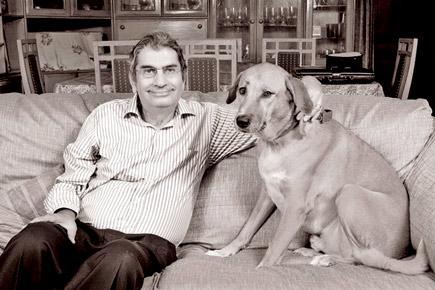
Vinod Mehta
TV and I
(Pages 27-28)
Rajdeep Sardesai and some other TV anchors believe print editors are ‘jealous’ of TV anchors since print publications can never dream of reaching the numbers television does.
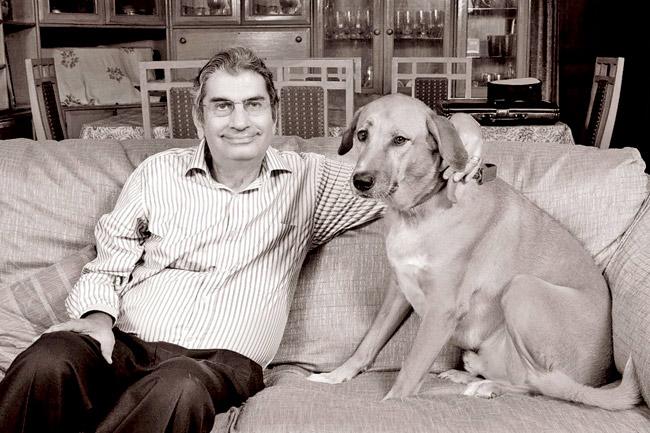
Vinod Mehta relaxes at home with his pet dog, Editor (Below) Mehta writes in his book that he wouldn’t trade places with TV journalists like Rajdeep Sardesai. Pic/Bipin Kokate
ADVERTISEMENT
Some tangential truth here. However, I must refer to a discussion at the Delhi Press Club on the ethics of the Radia tapes exposure in December 2010. Rajdeep accused print editors of cutting professional corners-why did we not check with those on the tapes before publishing them seemed to be his main complaint. And he supplied the answer himself — because we were ‘envious’ of TV anchors who outdid print editors in consistently scooping the Radia type of stories and also for the Page-3 kind of popularity they received. I am happy to report he was shouted down by other journalists, print and TV.
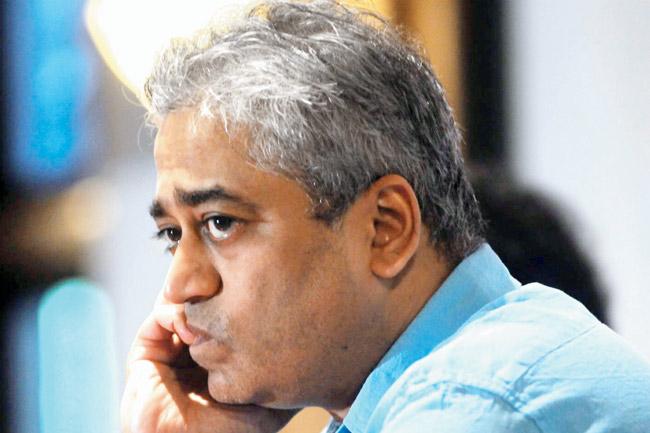
I have been a print editor for nearly forty years and it gets to me when someone at the airport or at a cocktail party asks, ‘I see you a lot on television. What else do you do?’ Face recognition is what we printwalas are presumably envious of. However, I wouldn't trade places with Rajdeep. I am quite happy to be a print journalist who occasionally appears on TV. Not the other way around. On most evenings when TV anchors are tearing their hair out predicting the end of the world or at least the end of the republic, it is the morning paper which puts things in perspective and places the event or events in their proper context. The discreet charm of the written word is my only lord and master.
As must be obvious, I am an accidental mini TV celebrity. As long as I don’t let it go to my head, as long as the vanity is kept under control, as long as one treats the fame as something of an impostor, as long as you remember that those who claim to relish your flair and fluency will not remember a word you have spoken five minutes after the programme has ended, you will retain your sanity. TV journalists are in love with themselves. Their narcissism stems from the nature of their medium and the high they get when they see their mug on the screen directing proceedings. Caveat. Some of my best friends are television anchors!
What is my contribution to news television? Assuming I have made any, it must be my reputation as a drunkard. I can claim to be the first person to carry a glass of wine or whisky as I sit on my chair in my Nizamuddin study facing the camera. Since the live programmes begin around 8.30 p.m. and can last for an hour and a half, with yours truly lucky if he can get two sentences in-‘just coming to you, Mr Mehta’-sipping single malt while waiting for the anchor to free himself from the embrace of Ravi Shankar Prasad and Abhishek Manu Singhvi at each other’s throats, is a necessary timepass.
Good habits catch on. I would like to believe my example has inspired Manish Tewari, Chandan Mitra, Mani Shankar Aiyar, Swapan Dasgupta, Ram Jethmalani, Meghnad Desai to turn to the bottle at prime time. The list grows. Amen.
Understanding Narendra Modi
(Pages 255-259)
Narendra Modi is a loner. The loner of loners. The Oxford dictionary defines the genre as ‘a person who lives alone and wants to live alone’. He has Isaac Newton, Albert Einstein, Clint Eastwood, Greta Garbo, Alfred Hitchcock for company. You might be wondering how someone who is a mass leader and rabble-rouser can be a loner. The answer is easy. Quality loners are comfortable in crowds, it is the one-to-one relationship they recoil from. (When I suggested on a TV debate that Modi and Rahul had something in common — they were both loners — the BJP spokesperson nearly lost his kurta.)
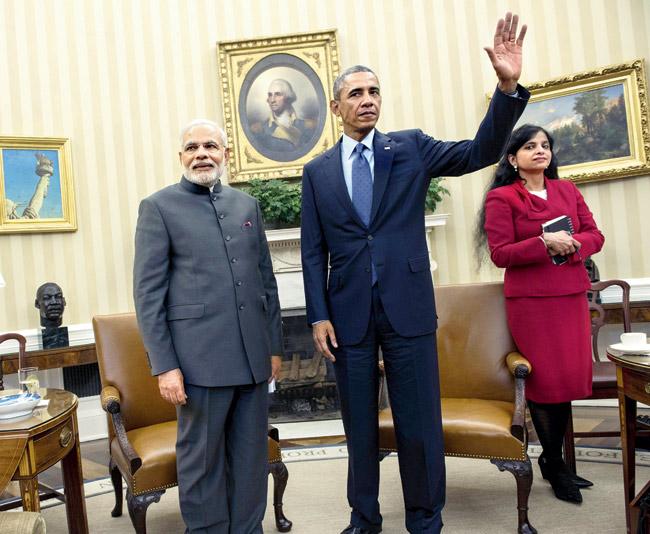
Prime Minister Narendra Modi and US President Barack Obama depart after a meeting at the White House in September 2014 in Washington, DC. Pic/Getty Images
In 2007, I sent Outlook senior writer Saba Naqvi to Gujarat on Mission Impossible. I asked her to put together a portrait of Narendra Modi, the human being. Even the enterprising Saba had to concede defeat but did manage to collect a few odds and ends. She reported, ‘No one gets through the armour of authority that he wears, no one can claim to have established a personal, warm relationship with the CM. The man is a paradox — a solitary soul with a following that would be the envy of even international cult leaders.’
The Modi residence in Gandhinagar is in tune with his loner personality. He does not run a ‘huge rambling establishment with a retinue of staff, live-in retainers and a regular flow of hangers-on.’ Instead, he is looked after by a staff of three — one cook and two peons. That’s it. His sole friend, Arun Jaitley, if you can call him that, lives in Delhi. Jaitley, who has helped him in legal matters, is not close in the conventional sense. Modi finds him convenient at the present time for certain tasks. However, he knows well no one covets his present job more than Jaitley.
Saba, on the same trip, came across an interesting party anecdote: ‘A popular joke about him in the state BJP rides on a comparison to the character, Raju Guide, who people suddenly saw as a holy man, in the Dev Anand classic, Guide. Modi was nothing more than an RSS pracharak, exiled from Gujarat for fanning trouble within the different factions of the state BJP. From 1996 onwards, he lived in a room in the BJP’s Ashoka Road national headquarters in Delhi, ate at the communal mess, and hung around joking with journalists when he was made in-charge of the national media between 1998-99. Then on October 7, ’01, he . . . was sent to Gujarat as chief minister . . . “Raju the guide became a Mahatma” goes the joke in BJP circles.’
...
Narendra Modi is obsessed with his public image. He told his biographer Nilanjan Mukhopadhyay he wakes up at 4.30 a.m. and ‘personally accesses his mail, surfs and checks Google alerts’. Mr Mukhopadhyay praises Modi’s eye for sartorial detail. ‘There was one occasion when he had to go to London and wanted several outfits virtually delivered overnight. He is very particular about button-holes of kurtas and pockets. He never wants them machine stitched and instead prefers the hand-tailored button-holes. The tailor asked him if he could do them on the machine, but he put his foot down.’ The pocket on the kurta has to be stitched to perfection because that is where he puts his favourite Mont Blanc fountain pen.
Narendra Modi is a strict vegetarian and is not fussy about food. He has a thing about meat-eaters. He told Saba Naqvi, ‘Maas khane wale logon ka vyavahar alag hota hai’ (‘Meat eating people have a different temperament’).
The prime minister was, and is, a ‘sharp’ dresser. RSS members are sworn to simple living and high thinking. According to Parivar sources, their chief Mohan Bhagwat owns just two dhotis — he wears one and washes one. Narendra Modi has his distinct approach to apparel. Ever since he got the top job, and even before, fashionistas and non-fashionistas were beguiled by his stylish, tasteful and pricey wardrobe, the details of which were made public by HT City fashion correspondent Snigdha Ahuja. She disclosed the name of the Mumbai-based high-society designer Troy Costa as the person responsible for Modi’s transformation. Mr Costa’s other clients include Hrithik Roshan, Saif Ali Khan, Anil Kapoor, Farhan Akhtar. Troy is tight-lipped about his latest patron, ‘I’ve had 200 journalists ask me for a quote on Modi. But I’ve never promoted myself.’
Narendra Modi can be generous. Recently, it came to be known he has a foster son, a Nepali by the name of Jeet Bahadur Magar. The two met in the late 1990s, when the boy, aged eleven and living homeless on the streets of Ahmedabad, got Modi’s protection. Robin Pagnamenta in the London Times reports, ‘Mr Modi, who at that time was an aspiring politician, said he had started showing concern for the boy, educating him. He gradually took interest in academics, sports and even learned Gujarati.’ The prime minister made sure Jeet was reunited with his family in August 2014 when Mr Modi went on a state visit to Nepal. The PM is still educating him.
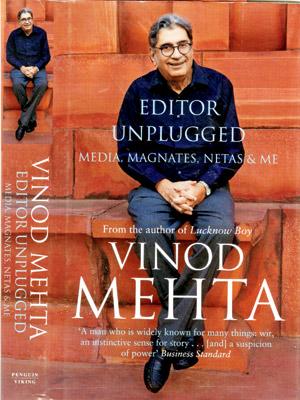
Editor Unplugged: Media, Magnates, Netas & Me, Vinod Mehta, Penguin Books India. Rs 599. Available in all leading bookstores
One stray comment he made to journalist Simon Denyer deserves attention. When Denyer interviewed Modi for the Washington Post, he said apropos of nothing, ‘I know how fascinated you foreigners are with India. I have a list. How many foreigners come here, how many like it here. A lot of them marry Indian women, some even marry their maids.’
Unlike Ashis Nandy, who has spent years analysing Modi, I am not a trained sociologist or a clinical psychologist. I am just, I hope, a superior hack. Therefore, I will refrain from drawing any portentous conclusions from the portrait drawn. All I will say is that our prime minister is a chameleon, a complex personality.
Excerpted with permissions from Penguin Books India from the book and the author.
 Subscribe today by clicking the link and stay updated with the latest news!" Click here!
Subscribe today by clicking the link and stay updated with the latest news!" Click here!







